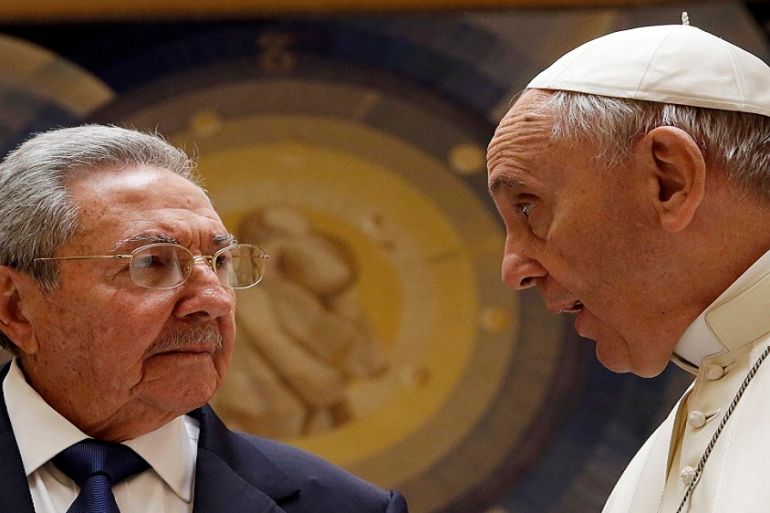Church-state rapprochement a blessing for Cubans
Pope-Castro meeting underscores the newfound friendship between atheist government and long-persecuted Catholic Church.

Havana, Cuba – Father Bruno Roccaro, 94, recalls the rebel uprising decades ago against dictator Fulgencio Batista and the Roman Catholic Church’s role in helping it along.
US-backed Batista had enriched himself at the expense of the Cuban people, and the Church was well aware of the suffering inflicted by his regime’s vast corruption.
Keep reading
list of 4 itemsPhotos: Sikhs celebrate harvest festival of Baisakhi, marking new year
Masses gather for Eid celebrations in India
The Take: How do the hungry mark Eid al-Fitr in Gaza?
With their pledges of socialist change, supporting Fidel Castro and his fighters seemed the way to go. But things didn’t exactly work out as envisioned.
![Padre Bruno Roccaro, 94, from Italy [Robert Kennedy/Al Jazeera]](/wp-content/uploads/2015/05/034f2f748c254245b9ab61a180682ac1_18.jpeg)
“During the revolution, the Church really helped Castro, we backed them up in the understanding that they would create a democratic government,” the spry nonagenarian padre told Al Jazeera from his parish in Old Havana, built in 1703.
“After they ousted the Batista regime, they nationalised the Catholic schools, which were very influential. That’s when we realised things weren’t really what we thought the revolution would bring.”
RELATED: Cuba’s medical magicians
Cuba’s population was 85 percent Catholic before the revolution, but that figure plummeted afterward. The officially atheist government expelled hundreds of priests and nuns, and shut down more than 400 Catholic schools in 1962, saying they espoused dangerous beliefs to the people.
Restrictions on the Church and its work lasted until 2010 when a normalisation of relations firmly took hold – a foreshadowing of the rapprochement between Cuba and the United States a few years later. Indeed, it was the Catholic Church that played a crucial peacemaker role that led to the December 17, 2014 joint announcement by Presidents Barack Obama and Raul Castro of a relations restart.
Things appear to have come full circle for the Church. Earlier this week, Castro met Pope Francis at the Vatican to thank the pontiff for his efforts in bringing Washington and Havana together.
“I read all the speeches of the pope, his commentaries, and if the pope continues this way, I will go back to praying and go back to the Church. I’m not joking,” Castro told reporters, comments that stunned many on the Caribbean island.
“I am from the Cuban Communist Party that doesn’t allow believers, but now we are allowing it. It’s an important step.”
Pope Francis will travel to Cuba in September – the third pontiff to do so in the past 17 years.
Keeping the faith
Orlando Márquez Hidalgo is editor and director of the well-read Havana Archdiocese publication Palabra Nueva. At his office in the late 18th century Catholic cultural centre in Havana, he told Al Jazeera the Church’s efforts cannot be understated in putting the Cold War foes back on track.
![Orlando Márquez Hidalgo is the director of the Catholic publication Palabra Nueva [Robert Kennedy/Al Jazeera]](/wp-content/uploads/2015/05/1b388cc532484516b22955ff353f41b2_18.jpeg)
“Pope Francis played such an important role in the dialogue between Cuba and the United States,” said Márquez. “He wrote letters personally to both presidents asking them to get together and end the conflicts that they had.”
Márquez highlighted the fact that despite the communist crackdown on religion after the revolution, the Church continued on with its mission to help humanity.
“It was a big challenge for the Church because of the properties it lost and the clergy who were thrown out of the country,” Márquez said. “Even though we had all these problems, and the majority of the population didn’t practise our religion, the Church still kept an eye on society.”
RELATED: Remembering the Bay of Pigs invasion
With a mostly impoverished population of 11 million affected by failed communist economic policies and a punishing US trade embargo, Cuba’s Catholic Church has played a vital role in helping the poorest of the poor.
Nuns have opened daycares and homes for the elderly, as well as centres for children with diseases such as Down Syndrome.
And education again is a main focus of its work.
![Firefighter Alejandro Ruiz Galiano, 27 [Robert Kennedy/Al Jazeera]](/wp-content/uploads/2015/05/c048c490340c43edadfb4b1cbdd4e8d2_18.jpeg)
Alejandro Ruiz Galiano, a firefighter, started going to Father Roccaro’s church when he was seven years old. “It taught me to be patient and honest, and to forgive those who did bad things to me,” said Galiano, 27.
“When there were no computers at the schools, the Church had a course here. It taught me a lot – it was Windows ’98.”
Work to be done
While optimism abounds over the thaw in Cuba-US relations, Márquez said fixing the economy must take priority. Cuba’s gross national income per capita is about $6,000 a year, ranking 109 among countries around the world.
Márquez blamed both US sanctions and the government’s economic policies for much of the suffering.
“The embargo blocked commerce and even the Church cannot get financial assistance from the Vatican for social projects such as soup kitchens. Anything that says ‘Cuba’ is stopped,” he said.
But, he added, poverty in Cuba is “structural” and “inherent to the system”.
“We wait and hope that this will be resolved with the economic reforms,” said Márquez. “If ideology continues to be more important than the economy, and control more important than progress, than the reforms won’t mean much.”
RELATED: Castro-Obama meeting has Cubans expecting freedom
For Father Roccaro, who emigrated from Italy to Cuba when he was 17 and turns 95 in July, the newfound friendship between church and state bodes well for improving Cuban lives.
“The process is very difficult to stop now,” the padre said. “Cuba is a religious place and that’s not going to change. Having faith in something is inherent in human beings.”